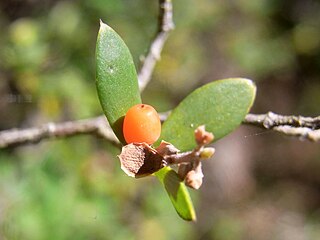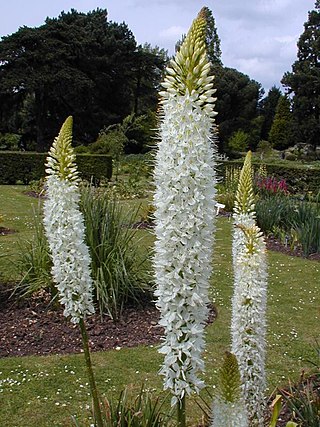
Nepeta is a genus of flowering plants in the family Lamiaceae. The genus name is reportedly in reference to Nepete, an ancient Etruscan city. There are about 250 species.

The genus Pulsatilla contains about 40 species of herbaceous perennial plants native to meadows and prairies of North America, Europe, and Asia. Derived from the Hebrew word for Passover, "pasakh", the common name pasque flower refers to the Easter (Passover) flowering period, in the spring. Common names include pasque flower, wind flower, prairie crocus, Easter flower, and meadow anemone. Several species are valued ornamentals because of their finely-dissected leaves, solitary bell-shaped flowers, and plumed seed heads. The showy part of the flower consists of sepals, not petals.

Osmunda regalis, or royal fern, is a species of deciduous fern, native to Europe, Africa and Asia, growing in woodland bogs and on the banks of streams. The species is sometimes known as flowering fern due to the appearance of its fertile fronds.

Sinningia is a genus of flowering plants in the family Gesneriaceae. It is named after Wilhelm Sinning (1792–1874), a gardener of the Botanische Gärten der Friedrich-Wilhelms-Universität Bonn. There are about 65 species of tuberous herbaceous perennials, all occurring in Central and South America, with the greatest concentration of species occurring in southern Brazil.

Ipomopsis aggregata is a species of biennial flowering plant in the phlox family (Polemoniaceae), commonly known as scarlet trumpet, scarlet gilia, or skyrocket because of its scarlet red flowers with lobes curving back as if blown back by rocketing through the air.

Hoffmannia is a genus of flowering plants in the family Rubiaceae. They are distributed in Mexico, Central America, and South America.

Acrotriche is a genus of flowering plants in the family Ericaceae. Species occur in all states of Australia. They include:

Benedikt Roezl was a traveller, gardener and botanist. Probably the most famous collector of orchids of his time.

Eremurus is a genus of deciduous perennial flowers in the family Asphodelaceae. They are also known as the foxtail lilies or desert candles. They are native to eastern Europe in, and temperate Asia from Turkey to China.

Eduard August von Regel, Russian: Эдуард Август Фон Регель; was a German horticulturalist and botanist. He ended his career serving as the Director of the Russian Imperial Botanical Garden of St. Petersburg. As a result of naturalists and explorers sending back biological collections, Regel was able to describe and name many previously unknown species from frontiers around the world.

Fallopia baldschuanica is an Asian species of flowering plant in the knotweed family known by several common names, including Russian-vine, Bukhara fleeceflower, Chinese fleecevine, mile-a-minute and silver lace vine. It is native to Asia, and is growing wild in parts of Europe and North and Central America as an introduced species.

Ribes roezlii is a North American species of currant known by the common name Sierra gooseberry.

Hamelieae is a tribe of flowering plants in the family Rubiaceae and contains about 171 species in 6 genera. Its representatives are found in tropical and subtropical America. The sister tribe Hillieae is sometimes here included.

Acanthophyllum is a genus of flowering plants in the family Caryophyllaceae with about 75 species, spread in the Irano-Turanian area.
The elm cultivar Ulmus 'Turkestanica' was first described by Regel as U. turkestanica in Dieck, Hauptcat. Baumschul. Zöschen (1883) and in Gartenflora (1884). Regel himself stressed that "U. turkestanica was only a preliminary name given by me; I regard this as a form of U. suberosa" [:U. minor ]. Litvinov considered U. turkestanicaRegel a variety of his U. densa, adding that its fruits were "like those of U. foliaceaGilibert" [:U. minor].

The taxonomy of Tulipa places the genus in the family Liliaceae, and subdivides it as four subgenera, and comprises about 75 species.
Amalophyllon is a genus of flowering plants belonging to the family Gesneriaceae.















